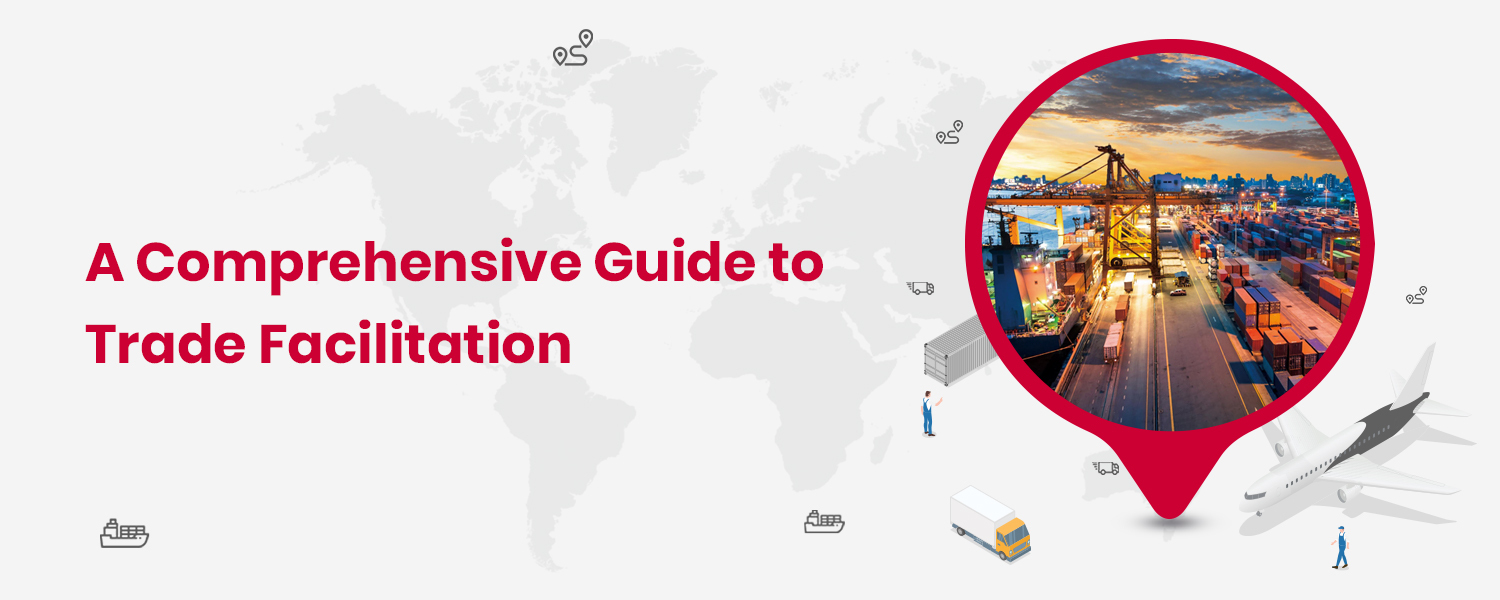International trade is filled with customs procedures, documentation, and border controls, which sometimes can feel like an Olympic hurdle race. Delays translate to lost profits, and complex regulations can leave even the most seasoned professionals scratching their heads.
To ease these complexities, international policymakers brought Trade Facilitation – the simplification, modernisation, and harmonisation of export and import processes.
This blog is your complete guide on Trade Facilitation exploring its objectives, implementation strategies, and the game-changing impact of the Trade Facilitation Agreement (TFA).
What is Trade Facilitation?
Trade facilitation is a pivotal tool for enhancing efficiency, reducing costs, and fostering economic growth. Simply put, it represents a strategic approach to streamlining and simplifying the procedures associated with moving goods across borders.
This comprehensive framework encompasses various initiatives aimed at optimising key aspects of international trade, including:
- Customs Clearance: custom duty in India is a time-consuming and complex process, trade facilitation advocates for expedited clearance through electronic data exchange and standardised documentation. This allows for faster processing and minimises the risk of delays and errors.
- Documentation: Trade facilitation prioritises the reduction of cumbersome paperwork by advocating for simplified and harmonised trade documents. This reduces the administrative burden for businesses and promotes greater transparency and consistency across diverse jurisdictions.
- Border Controls: While ensuring security and compliance remains paramount, trade facilitation seeks to enhance the efficiency of border controls through risk-based inspections and improved coordination between border agencies.
By addressing these critical areas, trade facilitation fosters a more streamlined and efficient international trade environment. This translates to tangible benefits for businesses, including reduced trade costs, faster delivery times, and enhanced competitiveness in the global marketplace.
The Objective of Trade Facilitation
1. Reducing Trade Costs and Enhancing Efficiency
At the core of trade facilitation lies the critical objective of minimising costs associated with international trade. This encompasses streamlining border procedures, such as customs clearance, obtaining import export code (IEC), and other documentation through electronic data exchange and standardised formats.
2. Boosting Economic Growth and Competitiveness
The streamlined environment fostered by trade facilitation paves the way for increased trade volumes and investments, ultimately contributing to economic growth. Lowering trade barriers such as complex regulations and lengthy procedures allows businesses to participate more effectively in the global marketplace. This leads to job creation and increased economic development, particularly in developing countries often facing significant trade barriers.
3. Fostering Transparency and Predictability
Trade facilitation fosters a transparent and predictable trade environment by establishing clear, consistent, and readily accessible trade regulations and procedures. This is achieved by encouraging information sharing and open communication between businesses and government authorities.
4. Increasing Participation of Developing Countries
Recognising the unique challenges faced by least-developed countries (LDCs) in participating in international trade, trade facilitation aims to address their specific needs by providing technical assistance for implementing trade facilitation measures.
Trade Facilitation Agreement (TFA): Key Provisions
1. Transparency and Streamlining Procedures
Under the Trade Facilitation Agreement, governments must publish various customs information online, including duty rates, forms, and regulations. This removes the guesswork for businesses and ensures everyone can access the same crucial information.
Furthermore, the TFA encourages consultation with stakeholders, like businesses and trade experts, before introducing new trade rules. This collaborative approach helps to ensure that new regulations are practical and effective.
2. Efficient Border Management and Cooperation
The TFA aims to improve border management by fostering cooperation among government agencies involved in import and export. This can involve aligning working hours between agencies, sharing facilities, and even establishing “one-stop border posts” where traders can complete all necessary formalities at a single location.
Another key provision allows goods to move under customs control from the border to an internal customs office. This reduces delays by allowing businesses to complete clearance procedures away from the busy border, freeing up space and resources for smoother traffic flow.
3. Fair and Predictable Treatment at Borders
The TFA promotes fairness and predictability by establishing clear standards for appeals and reviews. This means businesses have the right to understand the reasons for customs decisions and challenge them if they disagree.
The TFA also promotes transparency and non-discrimination by requiring governments to publish procedures for controlling food and beverages at borders, offering the option of a second opinion if needed. Additionally, it ensures that charges are fair and transparent, limited to the cost of services provided, and penalties are proportional to any violation.
4. Expedited Release and Clearance of Goods
The TFA encourages standardised and improved customs procedures for the release and clearance of goods. This includes promoting the use of technology, such as electronic documentation and processing, to expedite the flow of goods.
The TFA also encourages risk management approaches, focusing on high-risk shipments while facilitating the movement of low-risk goods. Additionally, it allows for simplified rules for “authorised traders” with a proven track record of compliance, further reducing processing times and costs. To top it off, the TFA encourages governments to publish transparent timelines for cargo clearance, providing businesses with predictability and peace of mind.
5. Promotion of Trade Facilitation in Developing Countries
The TFA recognises that developing countries may face challenges in implementing its provisions. To address this, the agreement allows for staged implementation, providing longer periods for compliance to allow these countries to build their capacity.
Furthermore, the TFA encourages providing technical and capacity-building support to developing countries. This can include training programs, workshops, and other resources to help them meet the agreement’s requirements, ultimately contributing to a more level playing field in global trade.
Additionally, the TFA encourages the establishment of national trade facilitation committees to coordinate implementation efforts within each country. The United Nations Conference on Trade and Development (UNCTAD) plays a crucial role by assisting countries with needs assessments, training, and the development of legal frameworks, further supporting their successful implementation of the TFA.
Conclusion
The Trade Facilitation is a milestone agreement paving the way for a more efficient and inclusive global trade landscape. By simplifying procedures, fostering cooperation, and promoting transparency, the TFA empowers businesses of all sizes to navigate the international market more confidently.
As an international logistics provider, NimbusPost leverages the benefits of the TFA to offer streamlined shipping solutions to businesses venturing into new markets internationally. From expedited customs clearance to reduced delays and costs, the NimbusPost removes the hassle of international shipping translating into a competitive edge for businesses.




